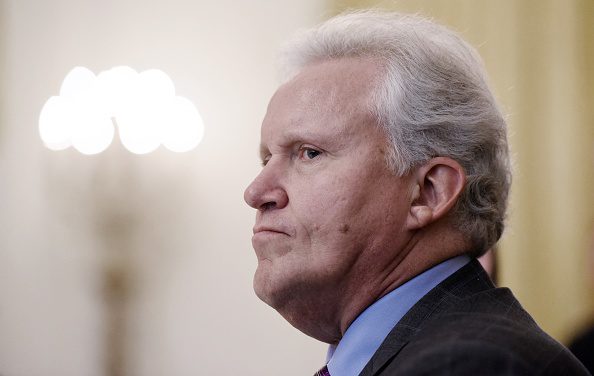

Once considered the best-managed company in America, a stalwart top 10 in the S&P 500 with a dividend safer than Fort Knox, General Electric has suffered a series of crushing blows to its reputation.
Incoming CEO John Flannery slashed executive bonuses, cut the dividend in half, threatened a fire sale of anything that moves, slimmed down the board of directors and invited Trian’s Ed Garden onto the board. The result? A stock price near the mid-teens, and a valuation dropping like a dead weight. What happened?
In a phrase, the 21st Century.
GE is a very large canary in the global coal mine. Its disruption is typical of what is happening all over the corporate board game. Not long ago, the committee that makes up the S&P 500 (they also approve the listings of the Dow) dropped oldie but goodies like Bank of America, Hewlett Packard, and Alcoa, and replaced them with Goldman Sachs, Nike, and Visa. Brands, image, and networks beat assets.
So what do GE’s lessons portend for the rest of American industry?
If change is the only constant, nimbleness is the primary skill for running a business and strategy is the next few steps and not a five-year direction. By GE’s vaunted standards, long-term strategic thinking actually slows down the speed we need to navigate abrupt shifts typical of global markets.
“Business has no shelf life. You really can’t be captivated by anything that’s happened in the past. It’s all about today and tomorrow in business.” – Jeff Immelt
I had the chance to interview former CEO Jeff Immelt in 2016, shortly before the current crisis, and his comments showed how fully aware he was of these challenges.
Immelt told me, “When I took over GE, the biggest surprise was the world twisted from one of relatively benign growth to one of just high volatility, high geo-political risk. In many ways, the environment today is nothing like what I thought it would be when I became CEO.”
Immelt set about to reconstruct GE for this new world, and while he did everything a highly capable CEO could possibly do, he could not move fast enough given the chaotic environment. The problem wasn’t Immelt, it was the legacy of how a major business operates, slowly and methodically.
Disruption today springs from many sources including the Chinese economic miracle, geopolitical disruption, public discontent with major institutions which began not long ago with Occupy Wall Street and is now evident as Bitcoin savagely attacks our financial markets. Consumer tastes didn’t change, they revolted. Tesla is now the most valuable automotive company in America with a fraction of the sales of GM or Ford. Yet, the company does no traditional advertising and does not have a dealer network.
When I put that example to Immelt, he simply said, “business has no shelf life, and what was right 10 years ago may now be obsolete. You are always planning for the next disruption, and that means looking at new markets all the time.”
So why didn’t GE see those changes coming and plan for them? In fact, Immelt did. The problem wasn’t in the strategy, but in the time it takes to implement it.
We are in a state like the Revolutionary War era when musket-loading weapons were slower than rifles, and that difference in speed meant powerful weapons were useless in battle although they made great sense in theory. Strategic planning requiring months of approval fails to stand up to Mark Zuckerberg’s ‘hacker mentality’ in which a team of Stanford dropouts creates a solution in six days not six months. The Department of Labor isn’t standing over their shoulders asking about equal opportunity or minimum wages. By the time the product is launched, Silicon Valley venture capitalists are ponying up millions to fund them to the next stage. In the glass headquarters of General Electric, teams are still working on their PowerPoints.
The changes put long-term planning itself in jeopardy. If it takes your team a year to develop a global competitive strategy, someone in Silicon Valley has developed an AI or Bitcoin replacement before your first brainstorming session.
Immelt saw this coming when he said to me, “I think we used to think that if you had good leaders you could be in any business. We want to have good leaders, but we actually believe that this deep domain expertise is also critically important for the future. Business has no shelf life. You really can’t be captivated by anything that’s happened in the past. It’s all about today and tomorrow in business.”
What was also implicit is that deep expertise is now divided into micro-segments—those which can be developed overnight and without unnecessary delays. Running a major global company relying on far-flung assets and employees will give way to newer models of crowdsourcing, AI driven decision making, and networked organizations.
The new era is teaching us Immelt’s edict that business has no shelf life, but it has also issued a painful edict to John Flannery: that GE has no shelf life either. The abrupt seeming changes he is making are not revolutionary, they are just a realization of this fact of modern business life.
In leaving GE just a few short months ago, Immelt realized how dire the world looked, even for a company as solid as GE. In the words of Winston Churchill, speaking of how his successor, Anthony Eden, would feel about him after taking over the Prime Ministership: “He will praise me for two days until he realizes I have left him with a job in which no one can succeed.”
For a time going forward, running a major global company may feel the same.




0

1:00 - 5:00 pm
Over 70% of Executives Surveyed Agree: Many Strategic Planning Efforts Lack Systematic Approach Tips for Enhancing Your Strategic Planning Process
Executives expressed frustration with their current strategic planning process. Issues include:
Steve Rutan and Denise Harrison have put together an afternoon workshop that will provide the tools you need to address these concerns. They have worked with hundreds of executives to develop a systematic approach that will enable your team to make better decisions during strategic planning. Steve and Denise will walk you through exercises for prioritizing your lists and steps that will reset and reinvigorate your process. This will be a hands-on workshop that will enable you to think about your business as you use the tools that are being presented. If you are ready for a Strategic Planning tune-up, select this workshop in your registration form. The additional fee of $695 will be added to your total.

2:00 - 5:00 pm
Female leaders face the same issues all leaders do, but they often face additional challenges too. In this peer session, we will facilitate a discussion of best practices and how to overcome common barriers to help women leaders be more effective within and outside their organizations.
Limited space available.

10:30 - 5:00 pm
General’s Retreat at Hermitage Golf Course
Sponsored by UBS
General’s Retreat, built in 1986 with architect Gary Roger Baird, has been voted the “Best Golf Course in Nashville” and is a “must play” when visiting the Nashville, Tennessee area. With the beautiful setting along the Cumberland River, golfers of all capabilities will thoroughly enjoy the golf, scenery and hospitality.
The golf outing fee includes transportation to and from the hotel, greens/cart fees, use of practice facilities, and boxed lunch. The bus will leave the hotel at 10:30 am for a noon shotgun start and return to the hotel after the cocktail reception following the completion of the round.